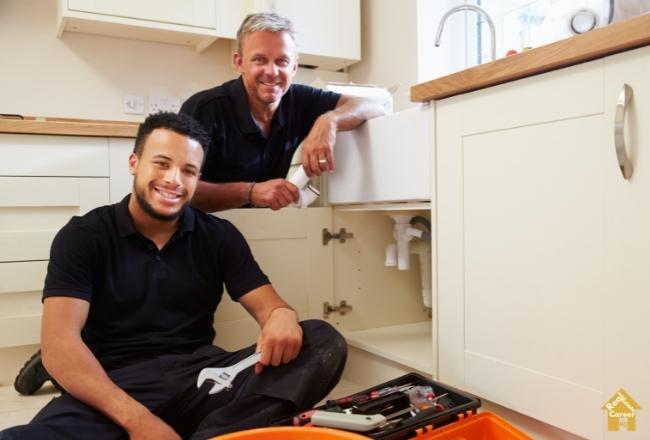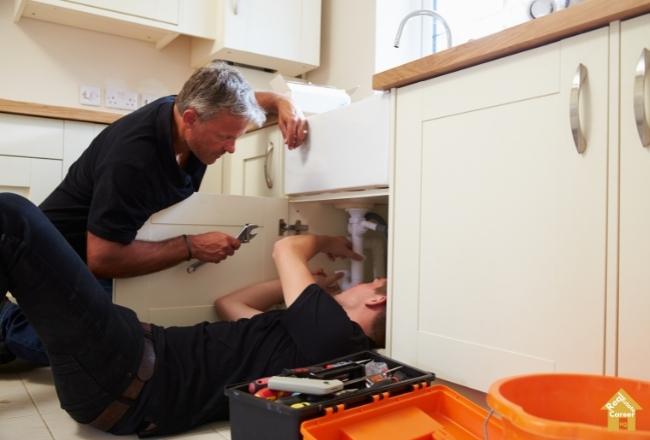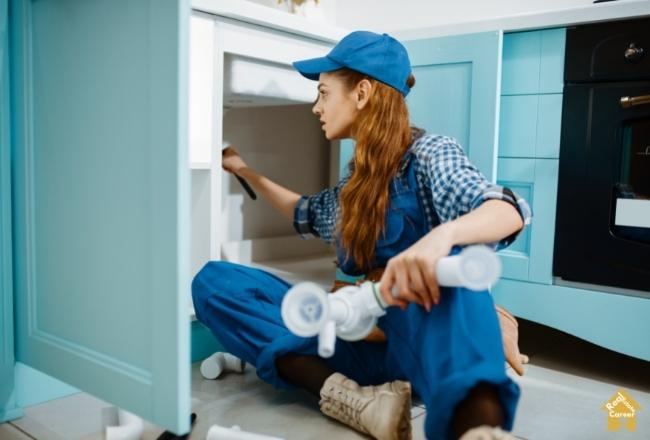(**) Disclosure: This post may contain affiliate links, meaning our company, JCHQ Publishing will get a commission if you decide to make a purchase through the links, but at no additional cost to you.
If you’re interested in a plumbing career and are wondering how to become a plumber in Arizona, you’ve come to the right place!
A plumber is a tradesperson who specializes in installing and maintaining systems used for water, sewage, and drainage. Plumbers are responsible for ensuring that these systems are installed correctly and function properly.
Arizona has a stringent standard for plumbers, and all plumbers in Arizona are required to obtain a license from the Arizona Registrar of Contractors. After all, the work involved could be complicated and may impact the health and safety of the community,
There are three types of plumbing licenses in Arizona:
- Specialty Commercial C-37 Plumbing
- Specialty Residential R-37 Plumbing, including Solar
- Specialty Dual CR-37 Plumbing (Commercial and Residential)
To become a licensed plumber in Arizona, an qualifying party must be at least 18 years old, hold a high school diploma, complete the plumbing education and apprenticeship program and obtain four years of plumbing work experience. Prospective licensee must also pass the Statutes and Rules Exam and the applicable Trade Exam, and submit an application and fees to the Arizona Registrar of Contractors.
On the state level, the Arizona Registrar does not issue apprentices or journeyman licenses, but individual cities may do so at their discretion. For example, according to the Phoenix Building Construction Code (PBCC), plumbing professionals are required to hold either a journeyman or apprentices license.
So it’s always better to check with the local jurisdiction to ensure you’re following their requirements.
In this guide, you will learn about the steps to obtaining a plumbing license in Arizona (on the state level). You will also find income updates, education programs, and FAQs on this profession.
So read on to learn more about what it takes to launch your plumbing career!
7 Steps to Become a Licensed Plumber in Arizona

Step 1: Meet the eligibility requirement
You must be at least 18 years old and have a high school diploma or its equivalent GED.
As you can imagine, there will be lots of measuring and gauging while working in the field. Therefore, having good math skills such as geometry, algebra, and metric measurements is certainly an asset.
Also, a strong understanding of science is necessary to understand how plumbing systems work. Physics, chemistry, and thermodynamics are particularly important for those who want to enter this field.
Step 2: Complete the plumbing education

Now, it’s time to equip yourself with the technical skills and knowledge required for the job.
There are several ways to do so, such as attending a training program at a vocational school, trade school, community college, or plumbing association.
Community colleges usually offer certificate or diploma programs, which can be completed in one to two years. Alternatively, some schools also offer two-year associate degree programs.
The curriculum should cover topics such as draining, venting, pipe cutting & soldering, water heating systems, the local plumbing codes, and electrical basic.
I’ll include a list of schools at the end of this guide.
Step 3: Enroll in an apprentice program

After completing the plumbing education, the next step is to join an apprentice program.
Most states, including Arizona, require that aspirant plumbers must have at least four years (8,000 hours) of apprenticeship experience before taking the state licensure exams.
There are two ways to get the required work experience, which are:
- Joining an apprenticeship program offered by a local trade organization or union
- Working as an entry-level worker under the supervision of a licensed contractor.
The advantage of going through an apprentice program is that you’ll receive both on-the-job training and classroom instruction.
During the on-the-job training, you’ll learn about a plumber’s day-to-day tasks while working under a licensed contractor’s supervision.
Meanwhile, the classroom instruction will cover topics such as blueprint reading, first aid, and safety.
Step 4: Pass the state-required exams

After completing the apprenticeship program, you’ll then need to pass two exams, which are:
- The Statutes and Rules Exam
- The Trade Exam
The Statutes and Rules Exam is a computer-based test covering state plumbing laws and regulations -especially Title 32, Chapter 10 of the Arizona Revised Statutes, and Title 4, Chapter 9 of the Arizona Administrative Code.
The required passing score is at least 70%, and it’s offered online through Mbition. There is a fee of $54. Mbition can be reached at 877-968-9331 or email support@mbitiontolearn.com.
Meanwhile, the Trade Exam covers practical aspects of plumbing, such as installation and repair. It is administered by PSI. You may contact them at 855-744-0310 or email examschedule@psionline.com.
Step 5: Obtain a license bond
After passing the exams, you’ll then need to get a license bond.
The purpose of the bond is to protect the state and the public in case you violate the plumbing code or cause damage to someone’s property or injuries to other people.
But keep in mind that this is not insurance to protect you. If you are looking for coverage to protect your plumbing practice, you should consider getting E&O insurance.
Step 6: Apply for an Arizona Plumbing License
Now that you’ve completed all the requirements, you can apply for a plumbing license from the Arizona Registrar of Contractors. To do so, you’ll submit a license application along with the required fees and relevant documents.
In the application, you would provide your personal info: education, technical courses, apprenticeship, experience, examination scores, and your business.
Since the State Registrar needs to protect the public interest, they will also require you to disclose if there have been any disciplinary actions against your professional or trades license. You are also required to go through a background check.
Furthermore, if you will be operating your own plumbing business, you need to register a legal entity first – sole proprietorship (individual), a partnership, a limited liability company, or a corporation. This can be done with the Arizona Corporation Commission except for Partnerships, which must be registered with the Arizona Secretary of State.
Once your application has been approved, you’ll be listed in the Arizona Registrar of Contractors database. You should visit the page to ensure that your license is active.
Step 7: Renew the plumbing license
All Arizona plumbing license needs to be renewed every two years. The renewal fee is $270 for residential plumbers, $480 for commercial plumbers, and $380 for dual plumbers.
To renew your license, you’ll need to submit a completed renewal application along with the required fees. You can find the renewal application on the Registrar of Contractors website.
FAQ on being a plumber in Arizona

How much do plumbers make in Arizona?
According to the Bureau of Labor Statistics (May 2021), plumbers, pipefitters and steamfitters in Arizona make an average yearly income of $55,479. The income range typically ranges between $38,370 and $62,820. Top earning Arizona plumbers make over $78,940.
Your earning ability as a plumber is subjected to many variables such as your experience, licensing level, the type of properties you specialize, the company size, its location, and most importantly, the amount of effort you are willing to put into this career.
How long does it take to become a plumber in Arizona?
It takes at least four years to become a plumber in Arizona. That is the minimum period to fulfill the work experience requirement. The duration would also depend on how long you complete the pre-license plumbing education, apprentice program, and pass the state-required exams.
How much does it cost to become a plumber in Arizona?
It costs between $350 to $580 to obtain a plumbing license in Arizona, which includes the application fee and license fee. The fees would depend on the plumbing license you’re pursuing. Here’s the breakdown:
- Specialty Commercial Plumbing (C-37): application fee $100, license fee $480, renewal: $480
- Specialty Residential Plumbing (R-37): application fee $80, license fee $270, renewal $270
- Special Dual Plumbing (CR-37): application fee: $100, license fee $380, renewal $380
In addition to the above, there will be other expenses such as tuition, E&O insurance, and plumbing equipment.
Some companies may pay or reimburse you if you work as their employee. But if you are running your own practice, these are the cost you need to account for yourself.
What states have plumbing license reciprocity with Arizona?
Arizona has a reciprocity agreement with California, Nevada, and Utah for the plumbing trade exams.
If you have a plumbing license in other states, you may apply for a waiver by filling out the Form RC-L-200G. However, this only works if the license requirements are comparable in both states.
Also, if you hold a license in the same classification within the preceding five years (must be in good standing), the Registrar may consider waiving the trade exam.
Keep in mind the waiver only applies to the trade exam and not the Arizona SRE Statutes and Rules Exam.
(**) Affiliate Disclosure: Please note that some of the links above are affiliate links, and at no additional cost to you. Our company, JCHQ Publishing will earn a commission if you decide to make a purchase after clicking on the link. Please understand that we include them based on our experience or the research on these companies or products, and we recommend them because they are helpful and useful, not because of the small commissions we make if you decide to buy something through the links. Please do not spend any money on these products unless you feel you need them or that they will help you achieve your goals.
Disclaimer: The information in this post is for general information only, and not intend to provide any advice. They are subjected to change without any notice, and not guaranteed to be error-free. Some of the posts on this site may contain views and opinions from individual not related to JCHQ Publishing. They do not necessarily reflect our view or position.
Reference:

